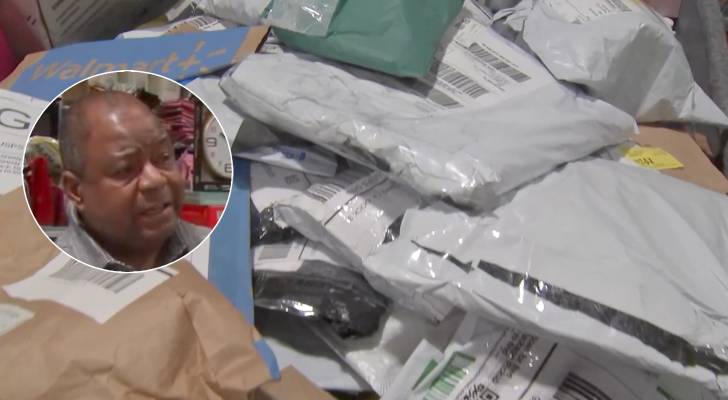‘They’re no-good, scum people’: Ohio man says he lost $27K after scammer came to his front door to ‘help’ with fake Apple ID hack — with other potential victims out there, here’s his warning


Robert Wise of Licking County, Ohio, is speaking out after allegedly being scammed out of $27,000 — and he’s not holding back. Don’t miss I’m 49 years old and have nothing saved for retirement — what should I do? Don’t panic. Here are 6 of the easiest ways you can catch up (and fast) Robert […]
I’m 24, debt-free, and earning my first steady salary. My dream is to own a house — but I’ve heard I should max out an IRA before building up a down payment. Which path do I choose?


Suppose you’re 24 and earning a steady salary for the first time in your life. Your goal is clear: save $10,000 per year and eventually buy a house. But like many in their 20s, you’re unsure whether you should prioritize retirement savings or homeownership. Don’t miss I’m 49 years old and have nothing saved for […]
‘A thief and a liar’: Lawyer Tom Girardi sentenced to 7 years for stealing more than $25M from the victims he represented to fund the career of his estranged Real Housewives star wife


Disbarred attorney Tom Girardi, 86, was sentenced to seven years and three months in prison for embezzling millions from former clients, according to NBC News. The former husband of the Real Housewives of Beverly Hills and a high-profile lawyer was once celebrated for his role in the landmark 1993 lawsuit against Pacific Gas and Electric […]
This Pennsylvania woman got a $12K utility bill — after waiting months for her statement. And lawmakers now say PECO isn’t acting fast enough for the thousands left in a similar situation


Posiey Brown of Norristown, Pennsylvania, was floored when she opened her PECO energy bill in April — totaling $11,723.93 in charges. “There’s no way,” she recalled thinking to CBS News Philadelphia in a story published May 30. It was the first utility bill she had seen in months and much higher than anticipated. Don’t miss […]
Texas woman suing after $83M lottery winnings put ‘on hold’ because she used a ticket app — 2 years after a global gambling group (legally) bought nearly every Lotto Texas ticket to win $95M


A group of international gamblers legally purchased nearly every number combination in a Texas state lottery drawing — a scheme designed to guarantee a win. It worked — and it may be why another woman is now suing the Texas Lottery Commission after being denied her own $83.5 million prize. “I’m being treated as the […]
‘Back up, cowboy’: Albuquerque woman living in the real ‘Breaking Bad’ house says she’s fed up with fans trespassing, throwing pizza on her roof — here’s how she’s fighting back
Breaking Bad fans are pushing one homeowner to her breaking point. Joanne Quintana, the owner of the Albuquerque house made famous as Walter White’s residence on the Emmy Award-winning series Breaking Bad, says what was once a brush with Hollywood magic has become a daily nuisance. In a viral clip that’s garnered nearly 3 million […]
Michigan police say ex‑Ford worker stole millions worth of car parts right off the line to then sell on eBay in years-long scheme — plus how US drivers can avoid getting burned by hot parts
Millions of dollars of brand-new Ford hoods, bumpers and taillights recently disappeared straight off the assembly line into an online market before Dearborn police cracked the case. According to Fox 2 Detroit, a former Ford Motor employee slipped the parts out of three plants in Wayne, Dearborn and Flat Rock over more than two years, then […]
‘Let’s see what happens’: NYC store goes viral for selling $4 ‘mystery boxes’ — but some packages come with an extra shocking surprise. Here’s what you need to know to protect yourself


A dollar store in the Bronx has gone viral after a TikTok video showcased its $4 “mystery packages.” The boxes, which contain returned merchandise from retailers like Amazon, Walmart and others, can hold anything from brand-new sandals to toilet plungers. The thrill of the unknown is part of the appeal — and business is booming. […]
This Florida couple says they paid a landscaper $27K to transform their yard — but all they got was some dead grass. Now, they’re suing and warning others to avoid falling for slick scammers


Nick and Susan Perfido of Seminole County, Florida, were looking forward to transforming their backyard into an outdoor paradise. They hired Florida Landscape Living LLC, a company based in Maitland, to do the job. “We’re going to have a fire bowl here — actually a fire table,” Nick told WESH 2 News while showing reporters […]
Canadian man gets 2.5 years in prison for ‘elaborate scheme’ using his mother’s identity to steal more than $420,000 from Social Security over 30 years. But how common is this, actually?


A Canadian man has been arrested, sentenced to two-and-a-half years in prison and ordered to repay $420,000 he stole in Social Security benefits over a 30-year period, the U.S. Attorney’s Office in Alaska said in a news release May 12. Ellis Kingsep, 77, was legally living in the U.S. and used an "elaborate scheme" to […]
